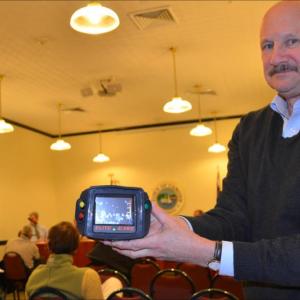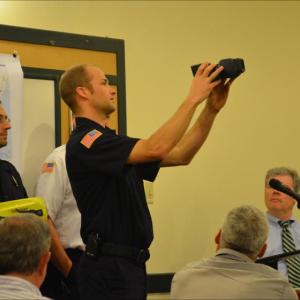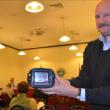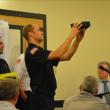Camden selectmen agree to disagree, as long as facts are straight
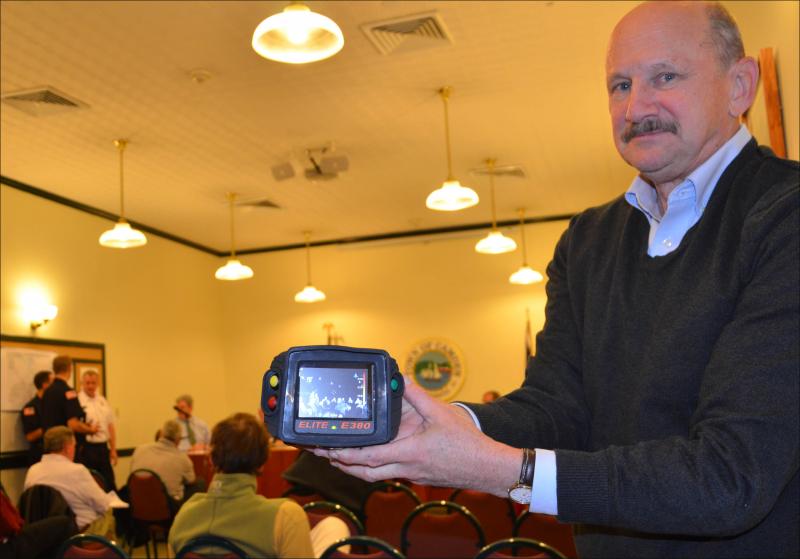 Camden resident, and former selectman and Camden firefighter, Jim Elliott gets a feel for the new $9,500 thermal imaging camera that has been acquired by the Camden Fire Department — thanks in part to a $5,000 donation from the Lowe family. Elliott trained on the original thermal imaging camera that Camden purchased in the 1990s. It is a heavy dinosaur compared to this new one, he said. (Photo by Lynda Clancy)
Camden resident, and former selectman and Camden firefighter, Jim Elliott gets a feel for the new $9,500 thermal imaging camera that has been acquired by the Camden Fire Department — thanks in part to a $5,000 donation from the Lowe family. Elliott trained on the original thermal imaging camera that Camden purchased in the 1990s. It is a heavy dinosaur compared to this new one, he said. (Photo by Lynda Clancy)
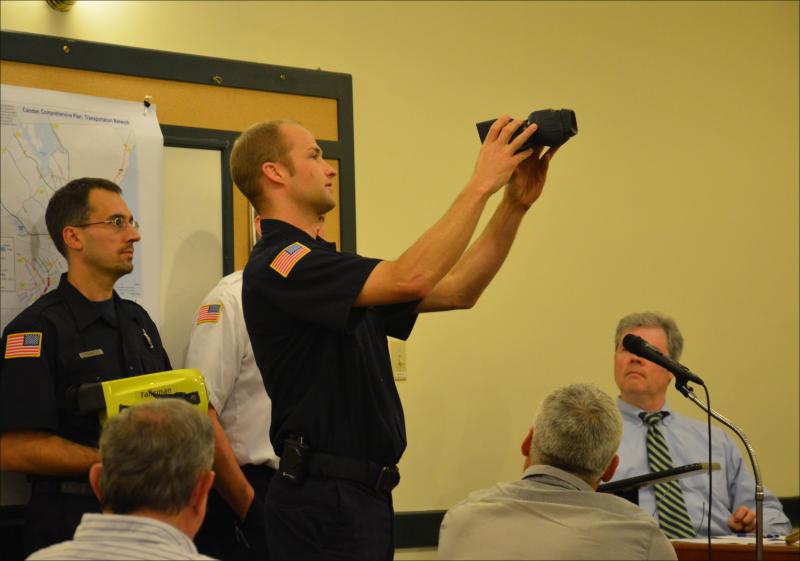 Camden firefighter Cheyne Hansen exhibits the town's new thermal imaging camera to the Select Board Nov. 13. (Photo by Lynda Clancy)
Camden firefighter Cheyne Hansen exhibits the town's new thermal imaging camera to the Select Board Nov. 13. (Photo by Lynda Clancy)
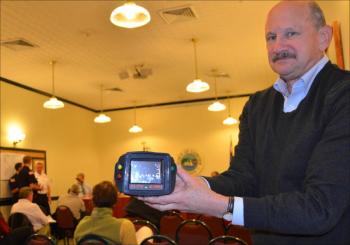 Camden resident, and former selectman and Camden firefighter, Jim Elliott gets a feel for the new $9,500 thermal imaging camera that has been acquired by the Camden Fire Department — thanks in part to a $5,000 donation from the Lowe family. Elliott trained on the original thermal imaging camera that Camden purchased in the 1990s. It is a heavy dinosaur compared to this new one, he said. (Photo by Lynda Clancy)
Camden resident, and former selectman and Camden firefighter, Jim Elliott gets a feel for the new $9,500 thermal imaging camera that has been acquired by the Camden Fire Department — thanks in part to a $5,000 donation from the Lowe family. Elliott trained on the original thermal imaging camera that Camden purchased in the 1990s. It is a heavy dinosaur compared to this new one, he said. (Photo by Lynda Clancy)
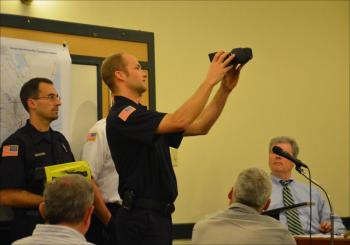 Camden firefighter Cheyne Hansen exhibits the town's new thermal imaging camera to the Select Board Nov. 13. (Photo by Lynda Clancy)
Camden firefighter Cheyne Hansen exhibits the town's new thermal imaging camera to the Select Board Nov. 13. (Photo by Lynda Clancy)
CAMDEN — John French and Leonard Lookner have a few traits in common: They are fiercely independent thinkers and do not want to be told not to express an opinion. The two Camden Select Board members may disagree widely on proposals and policies, but they both believe it is a privilege to serve the public, and in doing so, they also believe it is important to inform the public. As long as it's done honestly and for the purpose of encouraging participatory democracy.
While French believes every select board member has the right to speak his or her mind, he demands that accurate facts are delivered. Lookner does not want to be censored, or fall sway to what he refers to as "the brain police." The two are longtime municipal leaders, outspoken and unique in personality. They sometimes partake in public heated debate, like they did at the Nov. 13 Camden Select Board meeting, when Chairman Martin Cates introduced the idea of adopting a board code of conduct. French and Lookner weren't opposed to the idea, but they indicated they wanted to flesh out what such a code really means.
The regularly scheduled Tuesday meeting included a variety of agenda items, such as a lengthy review of 2013 harbor dock and mooring fees, and a public discussion about a proposed 195-foot telecommunications tower that may be constructed on Rockport land atop Ragged Mountain next April or May — pending Rockport Planning Board approval. The board also approved a $5,000 donation to the fire department from the Lowe family, made in the memory of Chris Lowe, to help purchase a $9,500 ($4,500 from the town's capital improvement account) thermal imaging camera. After a presentation by Camden firefighter Cheyne Hansen of the camera's features, it was passed around the room so everyone could get an idea of what it could define in a dark, smoky space. Heat and water-resistant thermal imaging cameras allow firefighters to distinguish body heat and are used in rescues. Camden's model Elite 380 incorporates a Hot Spot Tracker, which identifies the hottest object in the scene, tracks it and displays its relative temperature.
Code of conduct
Town Manager Patricia Finnigan had collected examples of conduct codes, or ethics and bylaws, from Kennebunk and Waterboro, which she included in the board's meeting packet. As the five members thumbed through them, Chairman Cates said he put the item on the agenda because boards in general, “are moving in that direction.”
“I am throwing this out here for general conversation,” Cates said.
Ethics codes are not uncommon to governmental boards. The U.S. Senate has a 63-page code of official conduct, as does the U.S. government's executive branch and a million other entities and organizations. Many municipal boards tuck their codes into their charters, while some, like Kennebunk, write them as separate documents.
While all the Camden board members agreed it was worth talking about, and cited points, such as Kennebunk's recognition that the board members, "recognize not to operate the town but to see that it is well operated" — they wanted time to digest the idea.
"When we talk about a code of conduct, how do you regulate," asked Lookner.
French said, "I think we do have a code. When we were elected we had an obligation to be leaders, to be factual with our information. We are five people and we work together as a group. We have to remember, when outside the group, that we need to do it in the right way, so that people are well-informed."
The discussion focused for a few minutes on the most recent Nov. 6 election and Camden's two ordinance amendments governing signs and nonconforming uses, which both passed at the polls. Prior to the vote, Lookner had written several pieces published in local media opposing the measures, while French, Cates and board member Don White had co-written a letter, also published in local media, supporting the amendments.
At the Nov. 13 meeting, French and Lookner sought to clear the air with an exchange about how they publicly expressed their opinions.
"What's potentially good for me is not good for you,” said Lookner.
“We had a disagreement on the last two ordinances,” said French. "You sat here and admitted that you stretched the truth, or you may have, when you wrote your first letter. You are certainly entitled to your opinions. But no matter what you do we are still selectmen. So you need to make sure the information you put in there is factual. A lot your points were fine, but that first letter was a little over the top. You wrote some good ones after that. I just felt you needed to keep the facts there."
Lookner acknowledged that he had termed a measurement as 6-feet instead of 6-square-feet, and clarified that some of the inaccurate information that he cited in his material had been provided to him by the town office. He maintained his right to express his individual opinion, even as a select board member.
“I don't want to be regulated by the brain police,” said Lookner. "I don't want to have my opportunity to express myself be thwarted.”
Further, Lookner said that if he dissents he wants to be able to write a letter to say why. And, he added, he respects the vote of the board, and ultimately the vote of the community.
The board then addressed the issue of where a select board member separates himself or herself from a leadership role, and states opinions as a citizen. Cates turned to Camden Town Attorney Bill Kelly, who presides at the table with the select board and town manager at each select board meeting.
“Bill, what is the line between elected official and citizen,” asked Cates.
Kelly said he had been involved with towns that passed recall provisions, in some cases when the motive was political. "They had seen behavior they didn't like so they wanted control over elected officials in a definitive way," he said.
He referred to another case in which a community recalled a selectman's election. At issue, he said, were just a few people targeting the selectmen, a situation he characterized as a "political football" and one that created polarization. In that incident, a recall vote was held but the selectman in question was not recalled.
Kelly said that while a select board member might regard his own opinions to be expressed as an individual and not as a town leader, "the public has great difficulty separating. There is no right or wrong in this discussion. It is a philosophical discussion. When you ran for office, what did you decide to put in the closet? Some say, give it up for the team, others say 'I did not give up my individualism.'"
His advice: "When you do take a position, state it clearly." And, he said, there is "no right answer. It is a process."
Lookner characterized the running of a town as a partipatory democracy.
"Some things go to the ballot, and it may be one of those things we disagree on," he said. "Consequently, I feel the need to lobby, or make the community aware of a certain issue."
By speaking out on the two ordinance amendments, Lookner said, “I think we did a great service to our community."
“I agree,” said French. “When you reference the town material, it needs to be correct."
“I will try to be more correct,” said Lookner. "I don't want to censor your behavior or you censor my behavior."
"I think we should operate under a code of ethics but Leonard is right too, we should not censor each other," said French.
Cates then suggested the matter would be moved forward to future meetings, after members have read the associated material.
Board member Jon Heard said he was especially drawn to conduct language that references civility.
In other town business
- The select board and town manager observed a moment of silence for Jeff Kuller, Camden's director of parks and recreation, who died Nov. 4 in a tree-cutting accident at his home.
"This past week was difficult for the entire community as we mourn the loss of Jeff Kuller," said Town Manager Finnigan. "On behalf of all the staff, I can say how much we miss Jeff, and will miss him in the future. Jeff's vision and goals are to continue without interruption. We will do it with vigor and knowing he is with us doing it."
- Planning Board member Lowrie Sargent told the board the effort to update the town's comprehensive plan has begun, and in time "Readers Digest" chapters will be forthcoming for review. He said there have been no official advertisements but encourages citizens to participate in the process, which is anticipated to span 18-plus months until a new document is ready for voters.
- The board approved West Bay Rotary's plan to hold a wine and beer tasting event at the start of the U.S. National Toboggan Championships in February. The event will take place Friday, Feb. 8, from 3 to 7 p.m., and music, "with moderation," will be allowed, as long as it is not amplified music.
“It doesn't mean Lynyrd Skynard,” said French.
- Harbormaster Steve Pixley reviewed with the board a series of proposed harbor fees, with a few increases for the 2013 season. The fees cover moorings, and float and dock tie-ups. A discussion ensued about ensuring equitable fees for residents and transients, which Lookner championed. At the same time, French argued for more space in the summer for locals or boaters from the islands and other harbors who want to visit for a few hours.
"We shouldn't be depending on revenue for boats at the head of the harbor," he said. "People want to tie up boats, go have lunch, shop, get a haircut."
He said the town floats are heavily occupied by big yachts, and advocated for more two-hour free tie-ups by smaller boats.
"It's not the pubic landing marina, not the public landing," he said. "The Town of Camden should not be a marina. I've said it every year and it still hasn't gone anywhere. Not bad for 15 years.” (That's how long French has sat on the Camden Select Board.)
Lookner said the goal was to encourage visitors to Camden.
"Boats spend a lot of money in town," he said.
Last year, the town saw $56,000 in docking revenue.
“Like I said, it's all about the money,” French said.
The board approved the proposed fees as presented, with one amendment to adjust resident mooring fees to be consistent with mooring fees charged to transient boat owners.
Pixley said a working group is looking at how municipal docks might be better used, and is talking to Castine about that town's method of charging day rates for boats.
Lookner commended Pixley for rolling out the red carpet for boaters in Camden. He referenced the town's catch-phrase, rolling out the carpet, not the red tape.
"There should be some recognition that Mr. Pixley does roll out the red carpet," said Lookner. "This is the kind of business we should be encouraging."
"We want a balance between the business and recreation side of it," said French.
“I couldn't agree more," said Lookner.
Ragged Mountain telecommunications tower
The possibility of a new 195-foot telecommunications tower on Ragged Mountain drew two citizens to the microphone, asking a variety of questions, including whether provisions are in place to require private business to remove the tower when its lifespan is over, as opposed to the cost being born by towns.
The proposed tower would be erected by Verizon Wireless on a 15-acre parcel of Rockport land owned by Wavesource LLC of Rockport. Charlie Foote III is the president of Wavesource LLC and has hosted telecommunications equipment on the property, including an existing tower, for a variety of public safety and private entities. In 2006, Rockport approved a Verizon Wireless expansion plan of its existing facility on the land there, which is in the town's zone that accommodates telecommunication towers and equipment. The new tower would be erected near the existing 195-foot tower to accommodate 4G communication technology.
4G is the name for the fourth generation of communication standards, and represents ultra-broadband Internet access for laptops, smartphones and other equipment. The latter could include high definition mobile television, video conferencing and three-dimension television.
Camden resident Dorie Klein suggested an escrow account be established for tower removal purposes. She also asked how many towers are allowed by the town on the Wavesource property.
Rockport's planner and economic development director, Tom Ford, attended the Camden meeting, and said Camden residents are welcome to "come and participate fully at the [Rockport Planning Board] review."
He said Rockport's planning board would hold its review of the tower application in December or January. Scott Henderson, an attorney with Verrill Dana law firm in Portland, represented Verizon Wireless at the Camden meeting and said he was waiting for the radio frequency report before filing a complete application with Rockport.
He also said the proposed tower would be available for other tenants and that any competing or future parties interested in having communications infrastructure on Ragged Mountain would have to co-locate on the new tower.
Henderson said, if approved, tower construction would take place in April or May, and involve the use of a helicopter over a one- or two-day period. The helicopter would stage at a yet-to-be-determined spot and lift components up onto the mountain.
Camden resident Gian-Angelo Gallace asked who would be liable if someone got hurt during the construction process.
"What if the helicopter does crash," he asked. "Who is legally responsible?"
He also said that there is no limitation on the number of towers, and that towers are only going to get bigger.
“It won't end," he said. "This is not a finite end.”
He defined two issues: what happens when the towers are obsolete, and how many towers can be built on top of Ragged Mountain.
Foote was also at the meeting, and he and Henderson said they climbed the mountain three weeks ago with Kuller, discussing the laying of fiber cable for enhanced service, and the poles, which Wavesource owns and which the Camden Snow Bowl uses to mount lights to illuminate its nighttime ski trails.
The fiber is strung by hand, said Henderson, and cable is run down the mountain. Access to the poles and cable trail will be made via four-wheelers or by foot.
The poles may eventually be moved to accommodate the installation of the mountain's new triple chair life, which is to replace the big t-bar lift.
Board member Jim Heard asked whether one tower would accommodate everything Verizon wanted to do.
Foote explained that all the existing equipment, plus the new Verizon equipment, could not fit onto one tower and be less than 250-feet in height. However, Rockport's ordinance does not allow towers taller than 200 feet.
As for the existing tower's lifespan, it "should be okay for a while," he said.
Foote said Kuller walked the mountain with him, bringing detailed maps, "in his usual organized fashion."
“He left us organized, too,” said Cates.
Kuller's presence was felt several times throughout the meeting, and at the end, Lookner commented on his service, held at the Camden Opera House Nov. 11.
"It was an incredibly difficult time for the community," said Lookner. "This is such a special community we live in, which can turn out that kind of emotion for someone who had lived a short time here. Jeff was not a good old boy, wasn't from a family who lived here forever. He wasn't a money person. He had content to his character. That is why everybody was there. There was no religious preference, no social character. Someone can finally be judged on the content of their character. I so thank the community.”
Related stories
Camden invites comments about proposed Ragged Mountain tower
Camden Select Board forgoes endorsing Maine bonds
Verizon sites a new telecommunications tower atop Ragged Mountain
Camden's Ragged Mountain loses good friend
Camden Select Board forgoes endorsing Maine bonds
Verizon sites a new telecommunications tower atop Ragged Mountain
Editorial Director Lynda Clancy can be reached at lyndaclancy@penbaypilot.com or 207-706-6657.
Event Date
Address
United States

